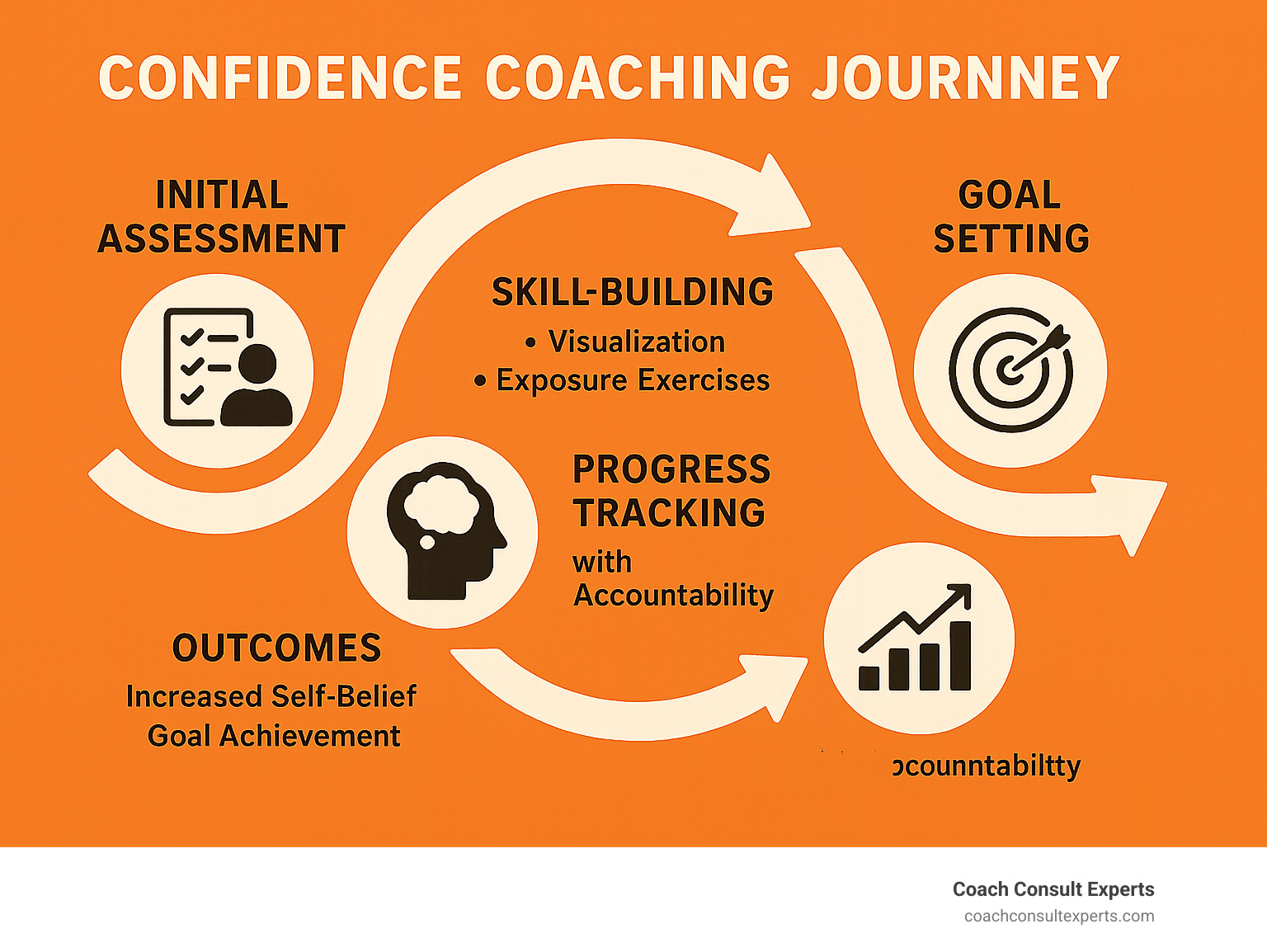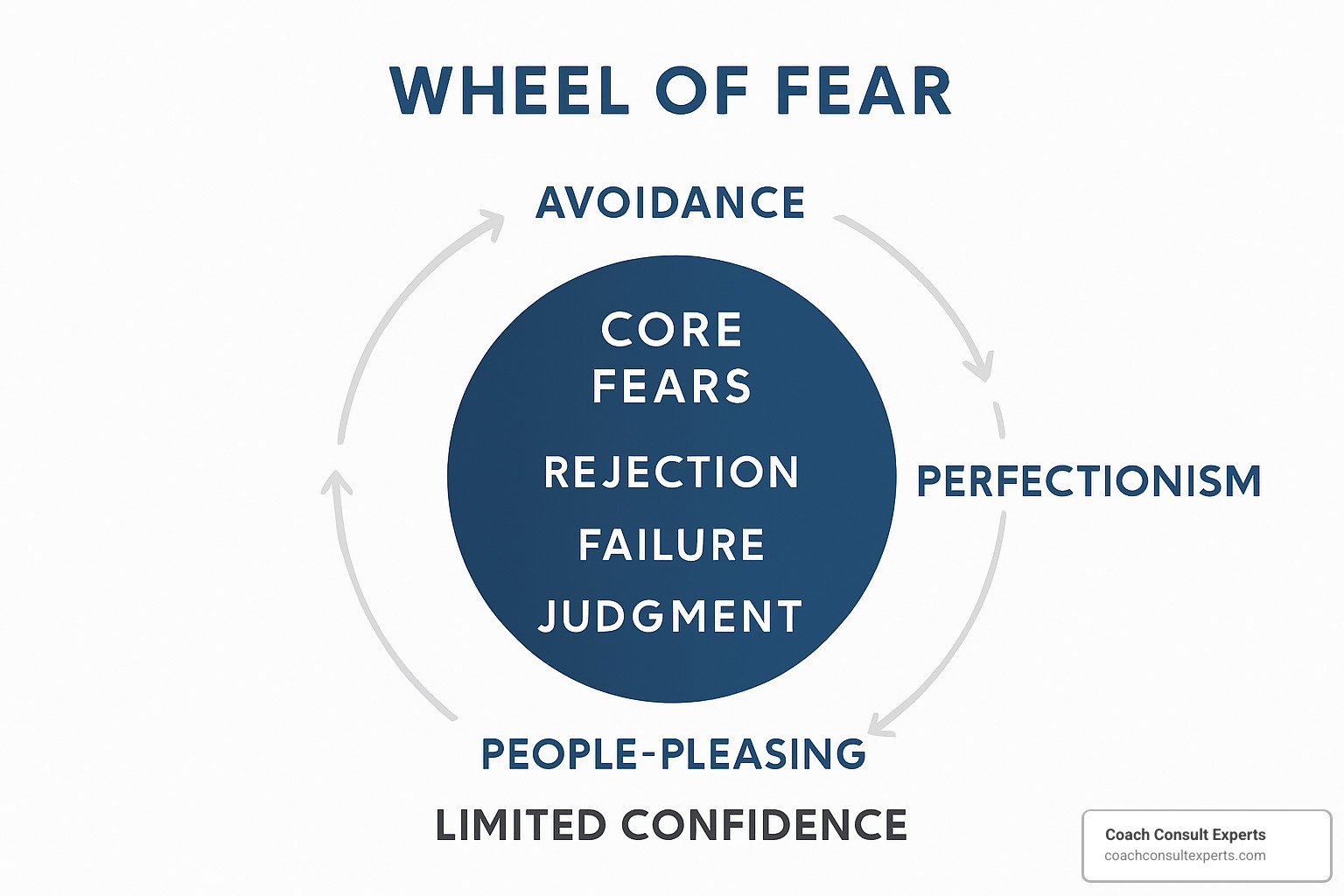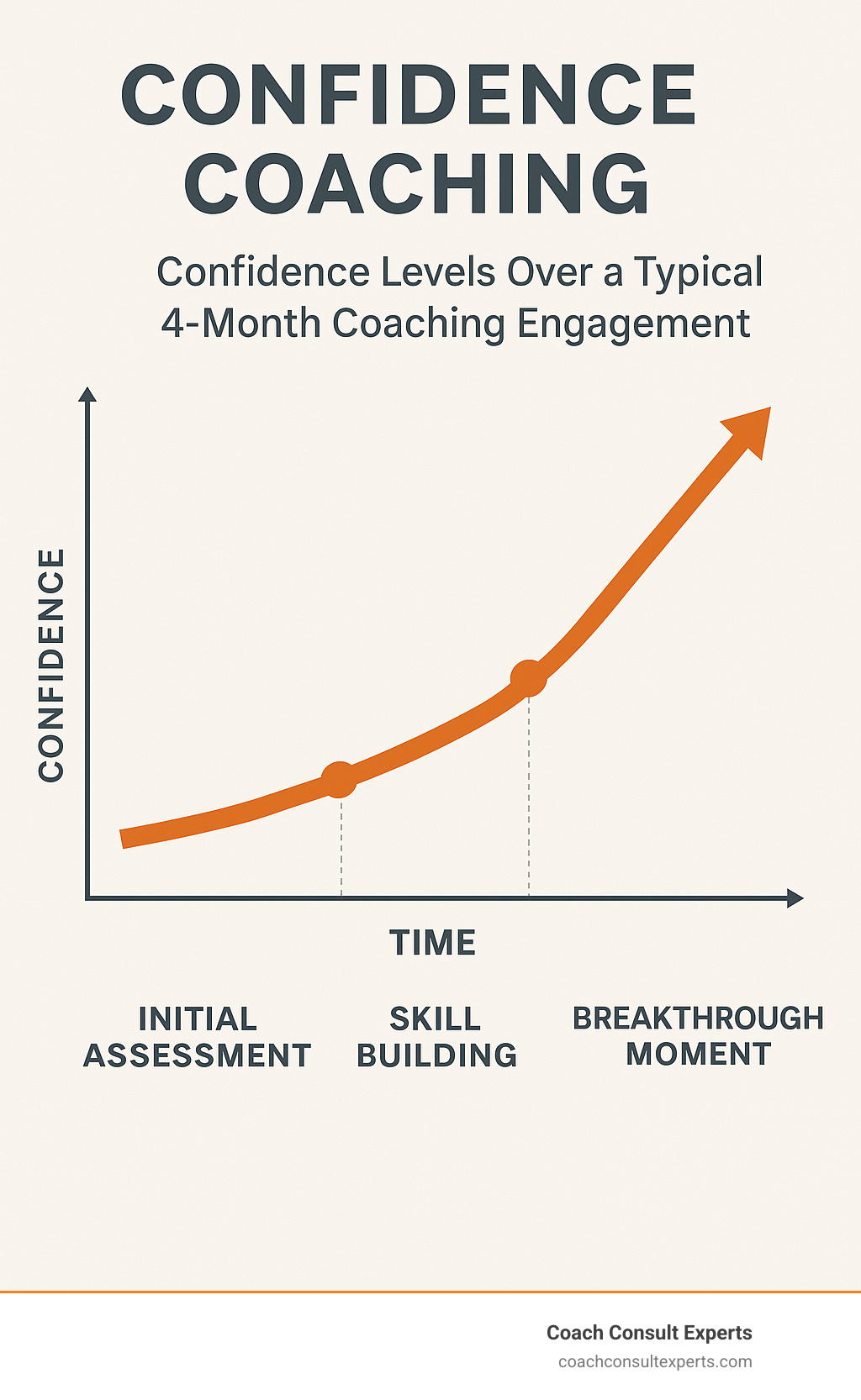Confidence Coaching: 7 Powerful Benefits for 2025 Success
Why Confidence Coaching Is Changing Lives
Confidence coaching helps people overcome self-doubt, build lasting self-belief, and achieve their personal and professional goals through proven techniques and supportive guidance.
What confidence coaching offers:
– Specialized focus on self-esteem, fear, and limiting beliefs
– Practical tools like visualization, exposure exercises, and thought reframing
– Structured sessions with goal-setting, accountability, and progress tracking
– Measurable results typically seen within 3-4 months
– Professional support from certified coaches with specialized training
The need for confidence support has never been greater. Research shows that 70% of girls believe they are not good enough, and there’s a measurable confidence gap between men and women that impacts achievement across all areas of life. Higher self-confidence is scientifically linked to better entrepreneurial success, stronger relationships, improved health outcomes, and greater career advancement.
Unlike general life coaching or therapy, confidence coaching zeroes in specifically on the mental barriers that keep you stuck – imposter syndrome, negative self-talk, fear of judgment, and self-sabotaging behaviors. It’s about building unshakeable self-belief that lets you take action despite fear.
I’m Coach Mary Chege-Kamau, a PCC Professional Certified Coach through the International Coaching Federation with specialized training in changeal and executive coaching. Over the years, I’ve helped thousands of professionals overcome self-doubt through confidence coaching, guiding them from uncertainty to living their highest vision with clarity and purpose.

Handy confidence coaching terms:
– coaching for self esteem
– coach yourself confident
– confident leadership coaching
What Is Confidence Coaching?
Confidence coaching is like having a personal trainer for your self-belief. Instead of building muscle, you’re building the inner strength to trust yourself and take action on what matters most to you.
Most of us weren’t taught how to handle self-doubt or fear of judgment. We learned to walk, talk, and ride a bike, but nobody sat us down and said, “Here’s how to believe in yourself when things get scary.” That’s exactly what confidence coaching fills in.
The beautiful truth is that confidence isn’t something you’re born with or without. It’s absolutely learnable. The American Confidence Institute has trained over 350,000 people since 2015, and their research confirms what we see every day: confidence is “100% coachable and 100% achievable.”
Confidence coaching works by getting to the root of what’s really holding you back. Maybe it’s that voice in your head saying you’re not qualified enough. Maybe it’s the fear that people will find you don’t know what you’re doing. Or maybe it’s the perfectionism that keeps you from starting anything new.
A confidence coach helps you understand these patterns and gives you practical tools to change them. This work addresses the big confidence killers: imposter syndrome, negative self-talk, fear of public speaking, procrastination when you’re scared of failing, people-pleasing that leaves you exhausted, self-sabotage right when things are going well, and constant comparison that makes everyone else look more qualified.
The magic happens when you combine understanding your patterns with actually practicing new ones. Real confidence comes from taking action despite the fear, not from waiting until the fear goes away.
How Confidence Coaching Builds Lasting Change
Confidence coaching works because it actually changes your brain. Scientists call this neuroplasticity – your brain’s ability to form new neural pathways throughout your life. Every time you practice a new thought or behavior, you’re literally rewiring your brain.
Research published in PubMed shows that nervous system regulation is directly linked to higher confidence levels. When your body feels safe, confidence can naturally emerge.
The change process works through several elements: Nervous system regulation teaches you to calm that fight-or-flight response. Self-compassion replaces that harsh inner critic. Cognitive reframing helps you catch and challenge undermining thoughts. Behavioral experiments are small, manageable risks that build real evidence of capability. Parts work helps you understand and heal protective parts that create self-doubt.
This approach is especially powerful for imposter syndrome – that feeling that you’re fooling everyone. Through coaching, you learn to own your accomplishments and truly internalize your competence.
Confidence emerges naturally when you address underlying fears and create genuine internal safety. For a deeper dive into this process, check out our guide on Overcoming Self-Doubt.
Confidence Coaching in Action: Sample Session Walk-Through
A confidence coaching session starts with a check-in where you’ll rate your confidence level and share progress since the last session. Next comes goal setting – maybe working on speaking up in meetings or preparing for a networking event.
The heart of the session is active listening and exploration through questions that help understand what’s beneath the surface. Then we apply techniques like visualization, parts work, or breathing exercises.
We end with action planning – small, doable steps you’ll take before the next session. These exposure exercises stretch your comfort zone without overwhelming you. The session closes with acknowledgment of progress and strengths shown.
Between sessions, you practice techniques and complete action steps. This is where real change happens – building confidence through consistent small risks rather than waiting for dramatic moments of courage.
Confidence Coaching vs. Life Coaching vs. Therapy
When struggling with self-doubt, it can feel overwhelming to figure out what kind of help you need. Should you see a therapist? Hire a life coach? Or work with someone who specializes in confidence coaching?
Confidence coaching has a laser focus on building unshakeable self-belief by identifying specific fears and limiting beliefs, then providing practical tools to overcome them. Life coaching takes a broader view for goal-setting and accountability. Therapy explores past experiences and mental health patterns.
| Aspect | Confidence Coaching | Life Coaching | Therapy |
|---|---|---|---|
| Focus | Self-belief, fear, limiting beliefs | Goal achievement, life transitions | Mental health, past trauma, diagnosis |
| Timeframe | Present and future-focused | Future-focused | Past, present, and future |
| Approach | Action-oriented with mindset work | Goal-setting and accountability | Healing and understanding |
| Duration | 3-6 months typically | 6-12 months typically | Varies widely, often longer-term |
| Techniques | Visualization, exposure exercises, cognitive reframing | Strategic planning, accountability, skill-building | Various therapeutic modalities |
| Credentials | Specialized confidence training | General coaching certification | Licensed mental health professional |
Confidence coaching is highly action-oriented. While therapy might spend months exploring why you have low confidence, confidence coaching focuses on building new evidence that you’re capable right now.
When to Pick Confidence Coaching
Confidence coaching is your best bet when self-doubt is the main thing standing between you and what you want. It’s particularly powerful for career growth, public speaking, leadership roles, entrepreneurship, athletes and performers, and life transitions.
The common thread? These are situations where you have the skills but need the inner conviction to use them. If you catch yourself thinking “I know I can do this, but I’m scared,” that’s your cue that confidence coaching might be exactly what you need.
Red Flags & Green Flags in Confidence Coaching
Watch out for toxic positivity – coaches who dismiss concerns with “just think positive.” Run from instant results claims. Avoid one-size-fits-all approaches. Be wary of boundary violations and high-pressure sales.
Look for trauma-informed practice, evidence-based methods, proper credentials (ICF certification or American Confidence Institute training), and good rapport. The right coach creates space for vulnerability while encouraging necessary risks.
Confidence isn’t about pretending to be someone you’re not. It’s about removing mental roadblocks that prevent you from being who you already are.
Common Challenges & Proven Techniques

The biggest confidence killer is negative self-talk – that harsh inner voice pointing out every flaw. Imposter syndrome makes you feel like a fraud despite clear evidence of abilities. Perfectionism becomes a prison where nothing is ever good enough. Social anxiety keeps you playing small due to fear of judgment. Procrastination often stems from fear rather than laziness. Fear of success can trigger self-sabotage when achievement brings visibility and pressure.
Research from Scientific research on nervous system and confidence reveals these challenges often stem from an overactive stress response. Your nervous system treats social threats like physical dangers, triggering fight-or-flight responses that make confident action nearly impossible.
Low confidence is usually fear wearing a disguise – fear of judgment, failure, or not being enough. The solution isn’t eliminating fear but learning to act confidently despite feeling scared.
Tools Confidence Coaches Use
Confidence coaching addresses problems from multiple angles using proven techniques that rewire your brain and nervous system.
Cognitive reframing helps catch and challenge confidence-undermining thoughts. Somatic practices work directly with your nervous system – simple breathing techniques shift you out of fight-or-flight mode. Power posing actually changes hormone levels and increases confidence.
Graduated exposure is like physical therapy for confidence – starting with small challenges and gradually working up. Visualization lets you practice success mentally before it happens in real life. Parts work helps you understand different internal voices and create internal peace.

The Wheel of Fear diagram shows how our deepest fears create protective behaviors that actually limit confidence. Understanding your personal wheel is often the breakthrough moment that changes everything.
Journaling techniques help build evidence of capabilities over time. An acknowledgement diary captures daily wins, while fear inventory exercises reduce the power of specific worries.
Quick Exercises to Boost Confidence Now
The three-breath reset is your emergency confidence tool. When self-doubt hits, pause and take three slow, deep breaths. This tells your nervous system you’re safe and creates space for confident action.
Power posing – stand with feet shoulder-width apart, hands on hips, chest open for two minutes before challenging situations. This actually changes brain chemistry and increases confidence.
Your small wins journal becomes your personal confidence database. Each evening, write down one thing you did well that day. A gratitude list focused on yourself builds self-appreciation. The friend test stops harsh self-criticism – ask “Would I talk to my best friend this way?”
Micro-challenges build confidence through small daily actions – make that avoided phone call, speak up in a meeting, give a genuine compliment. Confidence grows through action, not endless thinking.
For detailed strategies on building lasting self-worth, explore our guide: Coaching for Self-Esteem.
Choosing the Right Confidence Coach & Getting Started
Finding the perfect confidence coach feels like dating – you need someone who gets you, challenges you gently, and makes you feel safe enough to be vulnerable.
Before scrolling through coach websites, get crystal clear on what you want. Instead of “I want to be more confident,” dig deeper. Maybe you want to speak up in meetings without your heart racing or pitch your business idea without apologizing.
Credentials matter, but they’re not everything. Look for ICF (International Coaching Federation) certification and American Confidence Institute training. But a coach can have every certification and still not be right for you. That’s why quality coaches offer “findy calls” – free conversations where you get a feel for their style.
During these calls, pay attention to how you feel. Do they listen more than they talk? Do they ask thoughtful questions? Watch out for coaches who guarantee specific outcomes or push expensive packages before understanding your situation.
Ready to explore what confidence coaching could do for you? Schedule Your Findy Session to discuss your goals with our team.
Costs, Timelines & Expected Outcomes
Confidence coaching typically ranges from $1,500 to $15,000 depending on experience, program length, and format. Newer coaches might charge $1,500-$3,000 for three months, while seasoned professionals often charge $3,000-$8,000. Premium coaches can charge $8,000 or more.
Group coaching offers budget-friendly options at $300-$1,500 for 6-8 week programs. The investment often pays for itself quickly through salary increases, business launches, or promotions.

Most people see real changes within 3-4 months. The first month builds awareness, months two and three involve practicing new behaviors, and by month four, confident behaviors feel natural.
Good coaches track progress in measurable ways – confidence ratings, specific goal tracking, and behavioral counts. Sustainable change is more important than quick fixes.
DIY vs Professional Confidence Coaching
DIY confidence building can work if challenges are mild and you’re good at self-reflection. But most people trying DIY have already been at it for years with limited success.
Professional confidence coaching brings accountability, objectivity, and expertise. A coach sees patterns you can’t see and pushes you to take risks you’d talk yourself out of.
A hybrid approach often works well – start with coaching sessions to identify patterns and learn techniques, then use resources to practice between sessions. If confidence challenges significantly impact your career or happiness, professional support can be the catalyst for lasting change.
Frequently Asked Questions about Confidence Coaching
Can confidence really be learned or is it innate?
Confidence is absolutely learnable. The American Confidence Institute has worked with over 350,000 people and found confidence is “100% coachable and 100% achievable.”
The breakthrough in confidence coaching comes from understanding that you already have confidence inside you. It’s often buried under layers of fear or limiting beliefs. Thanks to neuroplasticity, our brains can form new neural pathways throughout our lives. When you consistently practice confident thoughts and behaviors, you literally rewire your brain.
How long before I notice results?
Most people start feeling different within the first 4-6 weeks of consistent confidence coaching. In the first week or two, you’ll gain awareness and learn immediate relief techniques. By weeks 4-8, you’ll notice significant changes – less anxiety in challenging situations and willingness to take small risks. The real change happens around 3-4 months when you consistently act despite fear.
Consistency matters most – practicing between sessions, trying new behaviors, and having outside support all speed results. Confidence grows as you accumulate evidence of your capability over time.
Do I need a certified coach to see benefits?
While anyone can call themselves a confidence coach, working with properly trained coaches significantly increases success chances. ICF-certified coaches complete rigorous training, while those with confidence-specific certifications know targeted techniques that work.
What matters most: Does the coach get results? Look for results-focused approaches, clear methodology, and strong rapport. Certification provides quality assurance, but the most important factor is whether the coach can help you achieve specific confidence goals through proven methods.
Conclusion
Building confidence coaching into your life isn’t just about feeling better – it’s about open uping the person you already are underneath the self-doubt and fear.
Confidence isn’t some mysterious trait lucky people are born with. It’s a skill you can develop and use to transform every area of your life. The science backs this up – when organizations like the American Confidence Institute have successfully worked with over 350,000 people, we know this works.
What makes confidence coaching different is its laser focus on the specific mental barriers keeping you stuck. Your brain is constantly rewiring itself. Every time you practice a confident thought or take a brave action, you’re building new neural pathways that make confident choices easier and more automatic.
Most people start feeling different within the first month of working with a skilled coach. By three to four months, they’re showing up as completely different people – speaking up in meetings, pursuing opportunities they would have avoided, and finally believing what others have been telling them: that they’re capable and worthy.
At Coach Consult Experts, we’ve seen this change happen countless times. Our approach combines the latest understanding of how the subconscious mind works with practical tools that create real change fast. When you overcome internal barriers and rewire your mindset, everything becomes possible – including the financial prosperity and lasting fulfillment you’re seeking.
The investment in yourself pays dividends far beyond the coaching fee. Better relationships, career advancement, business growth, and that deep sense of peace from finally liking who you see in the mirror.
Your confidence journey doesn’t require becoming someone new. It’s about removing layers of doubt and fear so the real you can shine through. That person who dreams big, takes chances, and shows up fully? They’re already there, waiting.
The only question left is whether you’re ready to meet them.
If you’re tired of playing small and ready to step into the confident version of yourself, let’s talk. Work With Me to find how our specialized approach to confidence coaching can help you break through barriers and achieve your goals with unshakeable self-belief.
Remember – confidence isn’t about never feeling scared. It’s about feeling the fear and doing it anyway. And that’s exactly the kind of courage we help you build.



